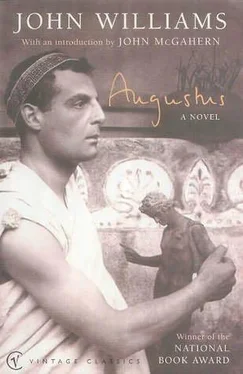John Williams - Augustus
Здесь есть возможность читать онлайн «John Williams - Augustus» весь текст электронной книги совершенно бесплатно (целиком полную версию без сокращений). В некоторых случаях можно слушать аудио, скачать через торрент в формате fb2 и присутствует краткое содержание. Жанр: Историческая проза, на английском языке. Описание произведения, (предисловие) а так же отзывы посетителей доступны на портале библиотеки ЛибКат.
- Название:Augustus
- Автор:
- Жанр:
- Год:неизвестен
- ISBN:нет данных
- Рейтинг книги:3 / 5. Голосов: 1
-
Избранное:Добавить в избранное
- Отзывы:
-
Ваша оценка:
- 60
- 1
- 2
- 3
- 4
- 5
Augustus: краткое содержание, описание и аннотация
Предлагаем к чтению аннотацию, описание, краткое содержание или предисловие (зависит от того, что написал сам автор книги «Augustus»). Если вы не нашли необходимую информацию о книге — напишите в комментариях, мы постараемся отыскать её.
Augustus — читать онлайн бесплатно полную книгу (весь текст) целиком
Ниже представлен текст книги, разбитый по страницам. Система сохранения места последней прочитанной страницы, позволяет с удобством читать онлайн бесплатно книгу «Augustus», без необходимости каждый раз заново искать на чём Вы остановились. Поставьте закладку, и сможете в любой момент перейти на страницу, на которой закончили чтение.
Интервал:
Закладка:
Though I had reasonable cause to believe that you should have thought my Tiberius to be more nearly your own son than was Marcellus, who was only your nephew, I forgave your choice upon the grounds of your illness and upon the grounds of your plea that Marcellus carried the blood of the Claudian, the Octavian, and the Julian lines, while Tiberius carried only the Claudian. I even forgave what I must see now as your insults to my son; if in the extreme youth in which you judged him he displayed what appeared to be some instability of character and excess of behavior, I might suggest that the character of a boy is not the character of a man.
But now your course is clear, and I cannot conceal from you my bitterness. You have refused my son, and thus you have refused a part of me. And you have given your daughter a father rather than a husband.
Marcus Agrippa is a good man, and I know that he has been your friend; I bear no ill will for his person. But he bears no name, and whatever virtues he may possess are merely his own. It may have been amusing to the world that a man with such a lack of breeding might hold so much power as a subordinate of the Emperor; it will not be amusing to the world that now he is the designated successor, and thus nearly equal to the Emperor himself.
I trust you understand that my position has become nearly impossible; all Rome expected that Tiberius should become betrothed to your daughter, and that in the normal course of affairs he should have had some part in your life. Now you have refused him that.
And you remain abroad upon the occasion of this marriage of your daughter, as you did upon the first-whether out of necessity or choice, I do not know. And I do not care.
I shall continue in my duty toward you. My house will remain your house, and open to you and your friends. We have been too close in our common endeavors for it to be otherwise. I shall, indeed, attempt to continue to remain your friend; I have not been false to you, in thought or word or deed; and I shall not be in the future. But you must know the distance that this has put between us; it is farther than even the Samos where you now sojourn. It shall remain so.
Your daughter is married to Marcus Agrippa, and has removed herself to his house; she is now mother to that Vipsania Agrippa, who once was her playmate. Your niece, Marcella, bereft of a husband, is with your sister at Velletri. Your daughter seems content with her marriage. I trust that you are the same.
III. Broadsheet: Tima?enes of Athens (21 B. c.)
Now who is mightier in the house of Caesar- the one whom all call Emperor and the August, or that one who, by all custom, should have been his loving helpmate, dutiful to both bed and banquet hall? See now how ruler is ruled: the torches flicker, the company is gay, and laughter flows more quickly than wine. He speaks to his Livia, and will not be heard by her; he speaks again, and is frozen by a smile.
It is said that he refused her a bauble; you'd think the Tiberwas agrip in winter ice!
But, ruled or ruler, it is no great matter.
There, from a corner, some Lesbia gives a glance that darkens the torches; bright Delias languish on couches, their shoulders bare in the dim light; but he disdains them all. For boldly there comes to him the wife of a friend (who does not see, his eyes being filled with the vision of a boy dancing to the torchlight). Why not? he thinks, this ruler of men. Of his time, Maecenas has given freely; this other little thing he never uses, surely he'd not begrudge.
IV. Letter: Quintus Homtius Flaccus to Gains Cilnius Maecenas, at Arezzo (21 B.C.)
The author of the libel is, indeed, as you suspected, that same Timagenes whom you have encouraged and aided, to whom you unwisely gave your friendship, and whom you introduced into the household of our friend. Besides being an ungrateful guest and uncertain in his meter, he is most foolishly indiscreet; he has bragged about his accomplishment to those who he imagines will admire him, while attempting secrecy among those who will not. He would have at once the responsibility of fame and the pleasure of anonymity, a condition which is clearly impossible.
Octavius knows his identity. He will take no action, though (needless to say) Timagenes is no longer welcome in his house. He has asked me to assure you that he holds you in no way responsible for the betrayal; indeed, he is as much concerned for your feelings in the matter as he is for his own, and hopes that you have not suffered an undue embarrassment. His regard for you is as warm as ever; he regrets your absence from Rome, and is affectionately jealous of the time you have decided to spend at the feet of the Muses.
I, too, regret not seeing you more often; but I believe that I understand even more fully than our friend the contentment you must feel in the quiet and beauty of your Arezzo, away from the bustle and stench of this most extraordinary city. Tomorrow I return to my little place above the Digentia, whose murmur will soothe my ears and at length return me from noise to language. How trivial all these matters will seem there, as they must seem to you in your retreat.
V. Letter: Nico laus of Damascus to Strabo of
Amasia, from Rome (21 B. c.)
My dear old friend, you have been eminently correct in your descriptions and enthusiasms over the years-this is the most extraordinary of cities in the most extraordinary of times. Being here now, I think that this is where my destiny has aimed me all my life, though I cannot bewail the long chain of circumstances that has delayed my discovery.
As you may know, I have in recent years become of increasing use to Herod, who knows that he rules Judaea only by the protection of Octavius Caesar; now I am in Rome upon another service to Herod, the extraordinary nature of which I shall reveal to you in due course. At the moment I shall content myself with saying that necessary to that service was the somewhat intimidating duty of presenting myself to Octavius Caesar himself. For despite the fact that you have written me so often of your familiarity with him, his fame and power are such as to overwhelm even your assurances. And I had, after all, once been tutor to the children of his enemy, Cleopatra of Egypt.
But again you were, as you are in all things, right; he put me at my ease at once, greeting me with even more warmth than I might have expected as an envoy from Herod, and recalled his friendship with you, remarking upon how often you had mentioned my name. I did not wish, upon such slight acquaintance, to bring up to him the matter which I had been sent to accomplish; and thus I was particularly pleased when he invited me the next evening to dine with him at his private residence-I had, of course, presented myself to him at the Imperial Palace, which I understand he uses only during his official day.
I must not really have believed you when you wrote me of the modesty of his home. The simple luxury of my own quarters in Jerusalem would put this house to shame; I have seen moderately successful tradespeople live in more elegance! And it is not, I believe, merely an affectation ofthat austerity toward which he urges others; in this charming and comfortable little house, he seems a friendly host eager to please his guests, rather than the ruler of the world.
Let me set the scene for you and recapture the essence of that evening, in the manner of our master, Aristotle, in those marvelous Conversations that we used to study.
The meal-three excellent courses, served in a comfortable style between the austere and elegant-is over. The wine is mixed and poured, the servants moving noiselessly among the guests. It is a small gathering, of Octavius Caesar's relatives and friends. Reclining beside Octavius is Terentia, the wife of Maecenas, who (to my regret, for I should have liked to meet him) is out of the city for the season, devoting himself to his literary studies in the north; upon another couch are Julia, the Emperor's young and beautiful and vivacious daughter, and her new husband, Marcus Agrippa, a large and solid man, who, despite his distinction and importance, seems oddly out of place in this company; the great Horace, short and somewhat stout with graying hair around a young face, has pulled down beside him the Syrian dancing girl who earlier entertained us, and (to her nervous yet exultant delight) is teasing her to laughter; the young Tibullus (who languishes in the absence of his mistress) sits with his wine and observes the company with benevolent sadness; nearby sits his patron Messalla (who once, it is said, was proscribed by the triumvirs, who fought with Marcus Antonius against Octavius Caesar, and who now sits in easy friendship with his host and one-time enemy!) and that Livy, whom you have mentioned so often, and whose first books of that long history of Rome which he has projected, have begun to appear regularly in the bookstalls. Messalla proposes a toast to Octavius Caesar, who in turn proposes a toast to Terentia, whom he attends with courtesy and regard. We drink, and the conversation begins. Our host speaks first.
Читать дальшеИнтервал:
Закладка:
Похожие книги на «Augustus»
Представляем Вашему вниманию похожие книги на «Augustus» списком для выбора. Мы отобрали схожую по названию и смыслу литературу в надежде предоставить читателям больше вариантов отыскать новые, интересные, ещё непрочитанные произведения.
Обсуждение, отзывы о книге «Augustus» и просто собственные мнения читателей. Оставьте ваши комментарии, напишите, что Вы думаете о произведении, его смысле или главных героях. Укажите что конкретно понравилось, а что нет, и почему Вы так считаете.











